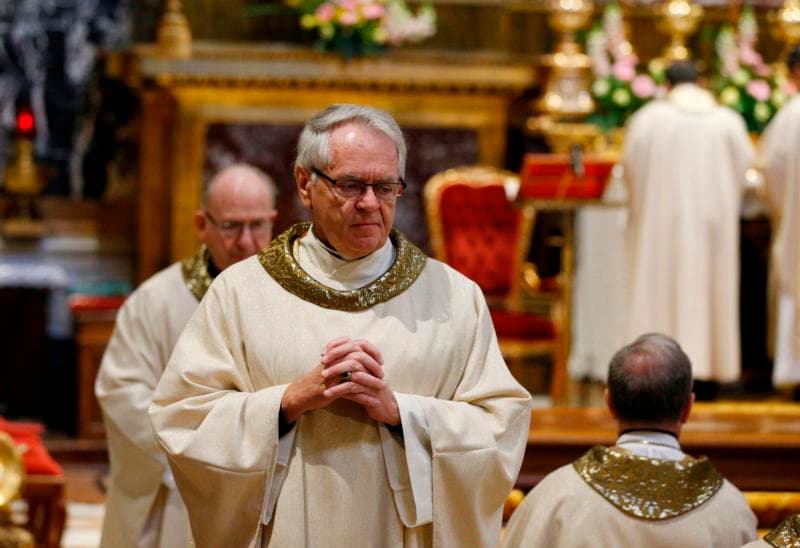LAS VEGAS — The “tragic death” of George Floyd, an African American killed while in the custody of a white police officer, “has torn the scab away from the gaping wound of racism that still infects communities across the globe,” said Bishop George L. Thomas of Las Vegas.
He made the comments in a pastoral letter, “When Words Fall Short: A Pastoral Letter on Racism,” issued June 10.
“What is needed in this critical moment is a genuine conversion of heart and a commitment to renew our communities,” Thomas said. “The words of Pope Francis ring true in our hearts: ‘Let no one think that this invitation is not meant for him or her.'”
Thomas was direct in the pastoral letter. “This time, words, chants, prayers and placards, however necessary and sincere, will not be enough to satisfy the hue and cry of the people. We want real evidence of real change,” he said.
“We are a church that holds that all life is sacred, from the moment of conception until natural death. Under the banner of Catholic social teaching, we say with resounding voices, ‘Yes! Black lives matter!'”
The bishop frequently cited both Catholic social teaching and the U.S. bishops’ 2018 document, “Open Wide Our Hearts: The Enduring Call to Love — A Pastoral Letter Against Racism,” in his own pastoral letter.
“There are no throwaway people, no second-class citizens and no disposable souls. Every person is an unrepeatable and unique gift of God, binding us together as a human family, as sisters and brothers, each with inestimable worth and inalienable rights,” Thomas said.
He reached back to quote the U.S. bishops’ 1986 pastoral letter, “Economic Justice for All: Pastoral Letter on Catholic Social Teaching and the U.S. Economy,” when the bishops said, “Human dignity can be realized and protected only in community.”
“What happens when certain individuals feel unsafe, unprotected, unwanted, and unequal in the very community whose purpose is to provide for them equal protection under the law?” Thomas asked. “Look no further than the headlines of the day.”
“Racist acts are sinful violations of justice. They wear many faces and don many disguises,” Thomas added.
“Racism can be seen in deliberate, sinful acts of violence and extremism, and in attitudes of superiority and prejudicial humor, he continued. “It is found in unjust social structures that tolerate or abet discrimination in hiring, in housing and lending practices, in the denial of educational opportunities, and in disparities in health care. Racism is clearly reflected in the disproportionate imprisonment of minorities.”
“It is also found in sins of omission and complacency, in attitudes of superiority, and in subtle inattention to injustice, most especially when people turn a blind eye to the presence of violence and overt acts of bigotry,” he said.
Putting Catholic social teaching’s preferential option for the poor into practice, Thomas said, “bids us to ask the difficult questions, ‘What are the underlying causes of poverty, misery, inequality and racism, and what must we do to effect real, concrete, and substantial change in the way we live, both individually, and as a society?'”
After having met with local, state and federal law enforcement officials over the past year, “I emerged from these meetings convinced we are a community that has not only learned much from the tragedies and failures of the past, but has also put into place best practices and sound policies to help promote high quality law enforcement and build community confidence,” said Thomas, who was installed in Las Vegas in 2018.
“Perfect? No. But every leader acknowledged that they and their agencies are works in progress, open to substantial community input and constructive criticism.”
Thomas said, “George Floyd’s death is a call to action and a time for community engagement among civic and government leaders, the ecumenical and interfaith community, and members of the community at large to listen attentively and to act decisively, helping address and eradicate the sin of racism and forge a future full of hope.”
He noted, “There are many ways to seize the moment,” he said, listing 16 specific actions, including getting educated on the history and causes of racism in the United States; raising your voice whenever you see racism, injustice or discrimination; disengaging from racial and discriminatory humor; helping to create a just workplace at one’s own workplace; making a conscious effort to engage with people beyond one’s own comfort zones to build relationships; and to “never underestimate the power of the polling place.”


















